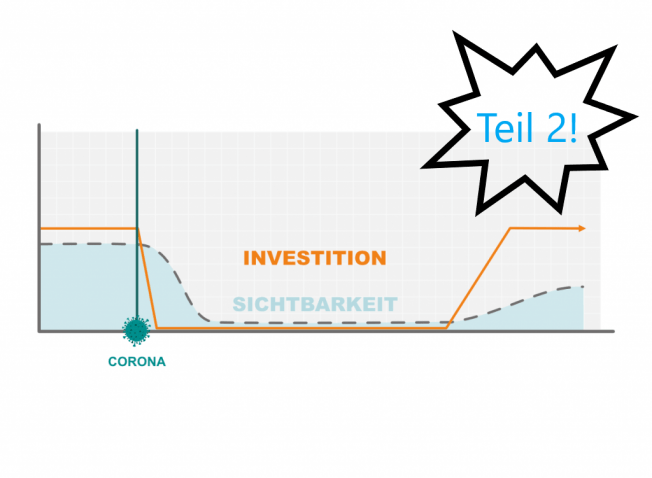6 experts reveal their marketing wisdom in times of crisis - Chapter 2


Despite ever greater easing, the Corona pandemic continues to impact the German and international economy. The big challenge these days: finding solutions and tackling challenges in a targeted manner.
In the second part of our series "Marketing in times of crisis" we would like to go into more detail and find marketing solutions for your company together!
In the second part? That's right! You can find the first part of our series on the question "Why is an investment in content marketing useful and important right now?" here.
Our marketing experts will show you exactly what these marketing solutions can look like and what you need to bear in mind when implementing such processes:
{{divider}}
6 good reasons - you should implement these content processes now
For the following collection of statements, we asked 5 of the most renowned marketing professionals in Germany the same question:
"What content and processes make sense in times of crisis?"
The result is 5 good reasons that speak for a timely content marketing investment:
"Flexible processes enable rapid responses to crises."
Especially in times of crisis, it is important to focus on the essentials in content marketing and marketing in general. The focus should be on the real added value of the content for customers and potential prospects. Of course, this depends on the industry and you should find out through appropriate research and analysis of your data, which challenges the industry and even more importantly the customers have to face in a crisis.
The content offerings that one provides as a company should therefore specifically target these challenges and potential problems.

Of course, people try to cut costs in crisis situations, and marketing is often quickly affected. It is quite understandable that advertising costs are cut at such times. Nevertheless, one should not save on the resources for content marketing.
Because good and, above all, helpful content can be invaluable in times of crisis. In this way, you show your existing customers and also new prospects that you also respond to customer needs in such times. This not only creates trust, but can also open up new target groups.
It is important to have flexible processes within the company and to be able to react quickly to such situations. This can also mean that you have to temporarily change your marketing strategies and align your marketing activities on your channels accordingly. If this flexibility has not been available so far, a crisis quickly shows that you should change something and optimize your internal processes accordingly. In this way, you will be prepared for similar situations in the future. - Tatjana Hein, Content & PR Manager, Piwik PRO
"Content must encourage interaction."
For me, the current crisis shows that content users want more than just heaps of content. They want to exchange ideas, ask questions, show their uncertainties. So we need more content that initiates, stimulates, and intensifies this kind of exchange. Many lively discussions after webinars currently show that this works.
We must not see content as a substitute for communication, but rather as the opposite: as a companion, optimizer, and promoter of communication in all phases of the customer journey! If we are honest, we have neglected this elementary task of content in recent years. Sometimes it seems as if companies want to entrench themselves behind a thick content wall. The new customer then appears as a number in the dashboard, and that's it.

In this context, we also have to ask ourselves whether we understand personalization correctly, which is, after all, an important goal in the content business: Is it enough to play out tailored content? Or does personalization also mean more contact with each individual person? What structures and processes can we use to meet this need?
That's my learning: Content has to create proximity. This can be achieved with fresh faces, for example; companies have to come out of hiding here. Talented influencers can play an important role. This also has an impact on the use of all content formats, whose communication strength we need to review and promote. - Doris Eichmeier, content manager and book author (including "The Content Revolution").
"Every content piece needs to be reviewed and added to as needed."
For me, the basis for content is the triumvirate of target group needs, corporate goals, and brand messages. Where these three areas overlap, relevant content is created for (potential) customers, corporate goals are supported, and a consistent appearance at all touchpoints strengthens trust in the company.

Trust in the crisis
Trust is particularly important in times of crisis. If the company is clear about its desired external image, only the form of presentation changes during the crisis. Everyday situations such as hugs suddenly have a negative connotation, but friendly interaction can be portrayed differently.
Continue to focus on target group needs
We have seen how quickly the needs of the target group can change. Their need for information has changed. Uncertainties have arisen that no one expected before. If companies had already focused on the target groups beforehand, it was logical to respond to these changes. Those who could respond well to the fears and new questions gained both reach and trust. As social media and online media were used more in the Corona period, brand awareness increased.
Check content
Due to the changed target group needs, the marketing planning and the existing content must be checked. Do blogposts need to be supplemented with advice such as travel warnings or tips for keeping your distance? Is there content that needs to be removed altogether because it suddenly has negative connotations?
Process Digitization by Corona
The Corona crisis was certainly an acid test for many processes. Are these clearly defined - or have they been muddled around until now (in Viennese)? If everyone is suddenly in a home office, this also challenges defined processes. But they are easier to adapt to the new circumstances. The process and responsibilities remain the same - the means of communication between people may have changed. Instead of simply coordinating briefly across desks, online meetings or chats were now added. Access to company servers had to be secured externally as well. Some new collaboration tools had to be used in addition.
What remains?
Many companies have been forced to examine their processes and habits. I hope that all content managers reflect. What has worked well, where have we identified improvements? And: what do we want to keep from the changes? - Irene Michl, content manager and book author (including " Think Content").
"Honesty will win in a crisis."

Take a stand. We can't hide from our target audience the situation we are all in. However, I believe that we should use our reach and visibility to link content with stories. Tell a story, make it an experience to buy your products and show: we are not just about the numbers and clumsy sales.
This will convince in the crisis: honesty, stories and continue to show activity. - Lisa-Alexa Kopka, Shop & Content Manager
"Brands need to stay true to themselves, especially in a crisis."
Even though it is impolite to answer a question immediately with a counter-question, I would like to allow myself this little vulgarity. After all, should a crisis influence my content marketing at all? Of course, depending on the industry, new challenges and opportunities arise in such an exceptional period, and brand managers have to respond to them.

However, the essential foundation of any brand - and thus the foundation of any marketing strategy - should remain unchanged in boom times as well as in times of crisis. I have outlined this brand foundation in detail in my books "Meine Marke" and "Ich Endlich Einzigartig". Here are the three most important points.
- Emotionality - Does my marketing appeal to the feelings of my target group? Am I conveying a feeling, an idea, or am I simply selling a product?
- Values - What do I burn for? What do I stand for? Am I willing to give up sales for this conviction? Should 100 people love me or 1 million people have "heard me before"?
- Added value - What problem am I solving? Where can I really help my target group?
I repeat myself: these things should always be the focus of content marketing. What's more, those who authentically fill their values with life and communicate with their target group in good times will be rewarded with loyalty in times of crisis.
My concrete tip therefore comes from a completely different industry, finance. There it is said: Back and forth makes the pocket empty. For brands, this means staying true to yourself. Have the courage to have rough edges. Because that's what we hold on to when a terrible storm rages.
- Hermann Wala, brand expert and bestselling author
"After crisis mode, you should pause and strategically readjust or readjust."

Before the crisis, I sometimes had the feeling that companies were producing content like there was no tomorrow at the expense of focus and quality. The crisis mode has led some companies to pause (forced or voluntarily).
This momentum should be used to think about strategy, customer benefits and future orientation. For many, the supposed focus on the customer is nothing more than a platitude. My recommendation: use the time for a few real customer conversations to find out where the pain points are and what really moves customers and users. - Svenja Teichmann, Managing Director crowdmedia GmbH
{{divider}}
DCMA - Start your content marketing investment here and now
In our Content Marketing Academy, we train you to become a certified Content Marketing Manager in just six weeks. Apply now hereor by clicking on the banner below.

6 experts reveal their marketing wisdom in times of crisis - Chapter 2
contentbird.blog







